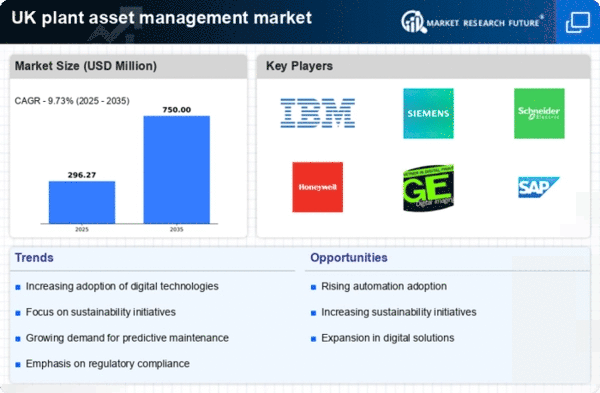Rising Operational Costs
The plant asset-management market is significantly influenced by the rising operational costs faced by industries in the UK. As energy prices and raw material costs continue to escalate, companies are compelled to seek more efficient asset management solutions to mitigate these financial pressures. The need to optimize asset performance and reduce waste is paramount, leading to increased investments in technology and process improvements. It is estimated that organizations can achieve cost reductions of up to 20% through effective asset management strategies. Consequently, the plant asset-management market is likely to see a surge in demand for solutions that enhance operational efficiency and reduce overall costs, as businesses strive to maintain profitability in a challenging economic environment.
Focus on Workforce Development
Workforce development is emerging as a pivotal driver in the plant asset-management market. The need for skilled personnel who can effectively manage and maintain assets is becoming increasingly apparent in the UK. As industries evolve, there is a growing emphasis on training and upskilling employees to leverage new technologies and methodologies in asset management. Companies that invest in workforce development are likely to see improved asset performance and reduced downtime. Furthermore, a well-trained workforce can enhance safety and compliance, which are critical in the plant asset-management market. This focus on human capital is expected to drive growth in the market, as organizations recognize that their employees are integral to achieving operational excellence.
Regulatory Compliance and Standards
Regulatory compliance plays a crucial role in shaping the plant asset-management market. In the UK, stringent regulations regarding safety, environmental impact, and operational efficiency compel organizations to adopt robust asset management practices. Compliance with standards such as ISO 55000 is becoming essential for companies aiming to enhance their asset management strategies. This regulatory landscape not only drives the demand for advanced asset-management solutions but also encourages investment in training and development. As firms strive to meet these compliance requirements, the plant asset-management market is projected to grow, with an increasing focus on risk management and sustainability practices. The financial implications of non-compliance can be severe, further motivating companies to invest in effective asset management.
Increased Demand for Data-Driven Insights
The demand for data-driven insights is reshaping the plant asset-management market. Organizations in the UK are increasingly relying on data analytics to inform their asset management strategies. The ability to collect, analyze, and interpret data allows companies to make informed decisions regarding asset utilization, maintenance schedules, and investment priorities. This trend is likely to enhance operational efficiency and reduce costs, as firms can identify potential issues before they escalate. The integration of data analytics into asset management practices is expected to grow, with companies seeking solutions that provide actionable insights. As a result, the plant asset-management market is poised for expansion, driven by the need for enhanced decision-making capabilities and improved asset performance.
Technological Advancements in Asset Management
The plant asset-management market is experiencing a notable shift due to rapid technological advancements. Innovations such as IoT, AI, and machine learning are enhancing asset tracking and predictive maintenance capabilities. These technologies enable companies to monitor equipment performance in real-time, thereby reducing downtime and maintenance costs. In the UK, the adoption of these technologies is projected to increase efficiency by up to 30%, which could lead to substantial cost savings. Furthermore, the integration of advanced analytics allows for better decision-making, optimizing asset utilization. As firms increasingly recognize the value of these technologies, the plant asset-management market is likely to expand, driven by the need for improved efficiency and reduced risks.
















